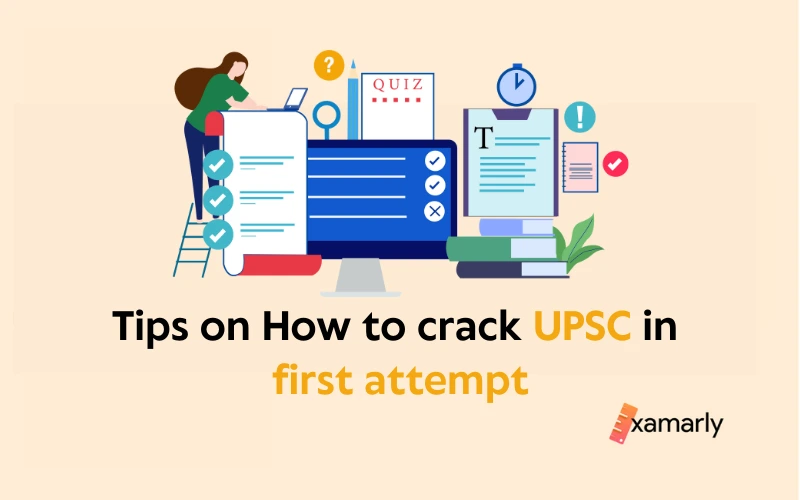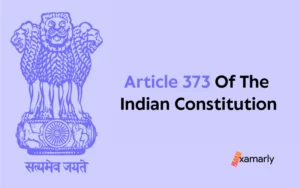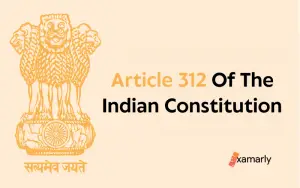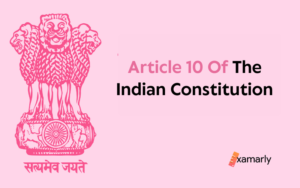The Union Public Service Commission (UPSC) exam is one of the most prestigious and toughest exams in India.
It attracts thousands of aspirants every year who dream of becoming civil servants and serving the nation. However, cracking the UPSC exam in the first attempt is not an easy task. It requires a lot of hard work, dedication, and strategy.
The exam has multiple stages, including the preliminary exam, the main exam, and the interview, each of which requires a different set of skills and preparation.
In this blog, we will provide you with some tips and tricks on how to crack the UPSC in first attempt. We will cover everything from understanding the exam pattern and syllabus to creating a study plan and an effective time management strategy.
So if you’re an aspirant looking for tips on how to crack UPSC exam in first attempt, then this blog is for you. Let’s get started!
- Stages of UPSC Civil Services Exam
- 12 Useful Tips: How to Clear UPSC in First Attempt
- List of IAS Toppers who Cleared UPSC in First Attempt without Coaching
- More Tips on How to Crack UPSC in First Attempt
- 1. Understand the Syllabus Thoroughly
- 2. Analyze the Previous Papers
- 3. Divide the UPSC Syllabus into Small Units
- 4. Plan Your UPSC Preparation Strategy and Follow it
- 5. Make a Study Timetable and Follow it Judiciously
- 6. Practice Answer Writing Skills
- 7. Discussing Topics Will Help in the Preparation
- 8. Revision Will Boost Your Preparation
- 9. Frame Your Own Questions to Boost Preparation
- 10. Solve Ample Sample Papers for UPSC Preparation
- 7 Best Ways to Approach Questions in the UPSC Mains Exam
- Conclusion
- FAQs on How to Crack UPSC in First Attempt
- What is the first step to cracking the UPSC exam in the first attempt?
- How many hours should I study every day to crack the UPSC exam in the first attempt?
- Should I join a coaching institute to crack the UPSC exam in the first attempt?
- How can I improve my writing skills for the UPSC mains exam?
- How can I stay motivated throughout the UPSC exam preparation?
- How should I approach the UPSC interview?
Stages of UPSC Civil Services Exam
To understand how to crack UPSC in first attempt it is essential that you familiarize yourself with the stages of the UPSC exam. These 3 stages of the UPSC examination are:
Prelims Exam
The preliminary exam has two papers: General Studies Paper I and General Studies Paper II, or CSAT (Civil Services Aptitude Test). Each paper has objective-type questions, with 200 marks each.
Both papers have multiple-choice questions (MCQs). Both are qualifying exams and marks do not get added to the final score, but for the selection of candidates, they need to score at least 33% to get qualified for the evaluation GS Paper I.
Mains Exam
According to the UPSC Mains examination pattern, all of the exams consist of descriptive answer-type questions.
The written examination includes nine papers, two of which are qualifying.
It is a rigorous step, and your overall marks in the UPSC mains will have a direct impact on your final results. Thus, the UPSC exam marks for the UPSC Mains phase are quite valuable because they play a key role in merit determination.
Read the following table to understand the nature of the UPSC Mains paper as well as the maximum marks these papers hold.
| Paper | Subject | Max. Marks | Duration | Nature of the Paper |
| Paper A | Compulsory Indian Language | 300 | 3 hours | Qualifying |
| Paper B | English Language | 300 | 3 hours | Qualifying |
| Paper I | Essay | 250 | 3 hours | Merit |
| Paper II | General Studies I | 250 | 3 hours | Merit |
| Paper III | General Studies II | 250 | 3 hours | Merit |
| Paper IV | General Studies III | 250 | 3 hours | Merit |
| Paper V | General Studies IV | 250 | 3 hours | Merit |
| Paper VI | Optional I | 250 | 3 hours | Merit |
| Paper VII | Optional II | 250 | 3 hours | Merit |
Interview
The interview stage in UPSC is also known as Personality Test and comprises 275 marks. In this advanced stage of the UPSC, candidates are required to answer a series of questions that are designed to assess their personality and suitability for the job.
The marks obtained in the remaining seven papers, as well as those earned in the interview test, are combined to determine your final score.
Related Reading: 7 Best Insights: Does Job Experience Matter in UPSC Interview?
12 Useful Tips: How to Clear UPSC in First Attempt
These 12 habits listed below will help answer the question of how to crack UPSC in first attempt and further help in setting your own personal goals and study plan.
- Start your preparation early and do not procrastinate.
- Keep a daily study diary/log of proper notes.
- Do not read long chapters at one go but read them in short chunks.
- Revise the previous day’s crisp notes before starting another chapter.
- Refer to NCERT books to clear the basic concepts and make your foundation strong.
- Raise your level of understanding by going through the standard books on particular subjects. But keep your study resources limited.
- Prepare your own effective notes from the books you refer to for the UPSC exam.
- Maintain a healthy lifestyle by eating well and exercising regularly.
- Get proper sleep each night, at least 8 hours of sleep is recommended for adults.
- Make time for relaxation, and try meditation or yoga as these can help you stay calm during the exam.
- Stay motivated and positive about your preparation and take regular breaks from studying.
- Learn to manage your time well and make use of it in the best possible manner.
Also Read: Booklist for UPSC by Toppers – Ultimate Guide
List of IAS Toppers who Cleared UPSC in First Attempt without Coaching
Many IAS toppers have successfully cracked UPSC without coaching in the first attempt. There is no better way to learn how to crack UPSC in the first attempt than by looking at their examples. Some of them are listed below:
- Arunraj secured AIR 34 in the UPSC exam in 2014.
- Neha Banerjee secured AIR 20, in 2019.
- Koya Sree Harsha secured Rank 6, in 2017.
- Akshay Agarwal who prepared from only internet materials secured AIR 43 in UPSC in 2018.
These IAS toppers’ success mantra is that they are self-motivated, hardworking, and have a basic understanding of self-study. Their dedication and hard work, which have brought them this far, are the key reasons for their success.
Their personal routine in clearing one of the toughest competitive examinations is what you should read in order to answer the crucial question of how to crack UPSC in first attempt.
More Tips on How to Crack UPSC in First Attempt
To crack UPSC (IAS) exam in the first attempt, you must understand the syllabus of the examination well. Analyze the previous papers of the IAS exam and divide the entire syllabus into small fragments.
Make a timetable and stick to it. These are some of the most important tips that will help you with guidance on how to crack UPSC in first attempt.
1. Understand the Syllabus Thoroughly
If you have applied for IAS, it is crucial to understand the UPSC exam syllabus thoroughly. For the civil services examination, the syllabus is long and diverse, and some sections of it are open-ended.
One of the most challenging sections of the UPSC exam is the current affairs section. By understanding the syllabus you’ll understand what to cover and what to skip while preparing for the UPSC Exam.
The UPSC syllabus is divided into three categories – General Studies, Optional Subjects, and Indian Languages. The general studies section covers a wide range of topics including history, geography, economy, etc.
The optional subjects refer to a number of specific subjects like Sociology or Psychology which may be chosen by candidates depending on their interests.
The third category refers to Indian languages which include Hindi, English, and other languages among others.
2. Analyze the Previous Papers
The IAS Exam is a challenging one that requires extraordinary preparation. Analyze the previous papers of the IAS exam to increase your chances of success. Analyzing these papers will give you a clear idea of the syllabus and exam pattern.
You can also use these previous years’ question papers to see what weightage each topic will get in the exam. Analyzing these papers will also give you an idea of the level of difficulty of each paper, which is crucial for success.
3. Divide the UPSC Syllabus into Small Units
If you are worried about the UPSC syllabus, break it down into small parts. So that you can easily consume it and understand it properly in less time.
This strategy will help you to study well for each part of the UPSC exam with ease as small portions are easy to understand.
4. Plan Your UPSC Preparation Strategy and Follow it
Planning your UPSC preparation strategy is the key to success. This strategy can help you focus your efforts and ensure that you cover the entire syllabus.
Besides, you will be able to find useful programs and materials in different media, and you will be able to interact with people from different socio-cultural backgrounds.
In addition, you will have a unique perspective on questions asked in the examination.
Also Read: 5 Effective Tips to Avoid Negative Marking in UPSC Prelims
5. Make a Study Timetable and Follow it Judiciously
The most significant strategy to prepare for the UPSC exam is to make a study schedule. Every subject must be given a certain amount of time for preparation. It is better to study for as long as you can according to your capacity in a day rather than more than that.
By making a study schedule, you can centralize your priorities and ensure equal efforts in every subject. You should also develop a rational mindset toward building up your basic knowledge.
It is imperative to study for the UPSC Exam according to the syllabus and paper pattern. It is also necessary to follow a study timetable that covers the entire curriculum and allows ample time for revisions.
6. Practice Answer Writing Skills
Developing answer writing skills is an important skill for UPSC, especially for the IAS Mains exam. While the examiner looks for correct spelling, appropriate grammar, and answer style, it is also essential to develop speed and accuracy in writing the answers.
If you are not already proficient in answering questions, practice writing them in a timed manner until they become second nature. Then, you will be able to write answers easily and quickly.
In UPSC mains, candidates should learn the structure and format of the questions. The outline should consist of an introduction, body, and conclusion. The structure of the answer should be consistent throughout.
Avoid using too many technical words and writing only to fill the word limit. This will put the examiner off and cause them to skip a question. Make sure to make all of your points relevant and support them with basic facts.
7. Discussing Topics Will Help in the Preparation
Discussing different aspects of any news or issue is an effective way to broaden your horizon and develop a critical approach to the news. Discussing topics will enable you to identify both positive and negative aspects of any issue by enhancing your critical thinking skills.
For example, discussing the importance of dowry, IR, and labour laws will enable you to understand how these subjects affect society. Ultimately, such discussions will enrich your UPSC preparation.
Taking current affairs notes is important for UPSC preparation. It is important not to memorize all topics but select specific names. While preparing for current affairs, students should also make notes on dates and times of important events by reading newspapers or magazines. If they don’t have time to make notes every day, they can shift this to the weekend.
Related Reading: How To Complete UPSC Mains Paper in 3 Hours? – A Clear-Cut Guide
8. Revision Will Boost Your Preparation
Dedicated time for revision of all subjects is another key to acing UPSC exams. The vast syllabus makes it difficult to recall all the relevant details and hence, consistent revision is essential for good performance.
It also helps you stay updated about recent events and news. You can even turn this leisure activity into a useful tool for your revision. Moreover, solving previous years’ question papers is a great way to test your speed and learn the nuances of the exams.
Moreover, revising old question papers is a great way to boost your UPSC Exam preparation. Try to solve a mock test series or previous year’s question papers. This will help you identify weak areas and fix your bookish knowledge gaps.
This will also boost your UPSC exam preparation significantly. You can do this by following some simple revision tips. You can also try to take mock tests.
9. Frame Your Own Questions to Boost Preparation
When preparing for the UPSC exams, it is important to practice answering multiple-choice questions and writing down your answers. While writing answers, it is important to reference your books throughout.
If you know what questions will come up on the exam, you can write your answers in advance. You should practice answering multiple-choice questions and answer writing at least once a week. This strategy can help you boost your preparation in the end.
Many aspirants treat UPSC preliminary examination as a learning opportunity. The truth is, your first try is precious. Attempting the examination without preparation can result in failure.
Lastly, frame your own questions to boost your Union Public Service Commission exam preparation. The process begins with analyzing the pattern of the examination. Once you understand the UPSC exam pattern, you can formulate questions based on the format of previous examination papers.
10. Solve Ample Sample Papers for UPSC Preparation
UPSC aspirants should solve plenty of previous year’s question papers to ensure that they know the syllabus well. In addition, they can filter out questions that are not directly related to their chosen subjects.
It is important to keep in mind that UPSC sample papers may not necessarily reflect the exact syllabus for the upcoming examination. But these papers can give an excellent idea of what to expect in the final examination.
Also Read: 25+ Best Online Platforms for UPSC Preparation
7 Best Ways to Approach Questions in the UPSC Mains Exam
Cracking the UPSC exam is a gruelling process. Students must be careful about how they approach it, particularly when it comes to handling questions.
There are several ways to give an effective answer in the UPSC mains exam. Practising the techniques mentioned below will help you ace the exam.
It is also important to remember that the UPSC Mains exam is not an exam of perfection. Instead, the questions are meant to assess your understanding of concepts.
Here are a few tips for first-time test takers:
- Approach questions from your own interests and strengths.
- Avoid selecting topics that you don’t know too well.
- Most of all, never hesitate to leave a question blank and move on if you’re not sure of the correct answer. You’ll have ample time to get back to these left-out questions later.
- Write analytical answers with the relevant data, and charts.
- Keep your paragraphs short. Use bullet points, charts, and diagrams instead of writing long paragraphs in the answer sheet. As this saves both time and space.
- Prevent yourself from writing answers that beat around the bush.
- If you can only remember two points of an issue, don’t waste time trying to remember the entire topic in the actual exam. Instead, write the answer using only the information you can recall. This technique saves time and effort.
You Might Also Like: 9 Tips: Last Month’s Strategy For UPSC Prelims
Conclusion
In conclusion, cracking the UPSC exam in the first attempt requires a lot of hard work, dedication, and strategy. However, with the right approach and mindset, it is possible to achieve your dream of becoming a civil servant.
Understanding the exam pattern and syllabus, creating a study plan, and practising mock tests and answer writing are some of the key strategies that can help you crack the exam in the first attempt.
Additionally, staying motivated, taking breaks, and keeping a positive attitude can go a long way in ensuring success.
Remember, the journey to cracking the UPSC exam is a long one, but with persistence, patience, and a clear strategy, you can make your dream of becoming a civil servant a reality.
We hope the tips and tricks shared in this blog will help you in your preparation for the UPSC exam. Best of luck!
FAQs on How to Crack UPSC in First Attempt
What is the first step to cracking the UPSC exam in the first attempt?
The first step is to understand the exam pattern and syllabus thoroughly. This will help you create a study plan and determine which areas you need to focus on.
How many hours should I study every day to crack the UPSC exam in the first attempt?
The number of hours you need to study will depend on your strengths and weaknesses. However, it is recommended to study for at least 6-8 hours every day to crack the UPSC exam in the first attempt.
Should I join a coaching institute to crack the UPSC exam in the first attempt?
Joining a coaching institute is not mandatory to crack the UPSC exam in the first attempt. However, it can be helpful to get guidance from experienced teachers and interact with other aspirants.
How can I improve my writing skills for the UPSC mains exam?
You can improve your writing skills by practising writing essays, answer writing, and mock tests. Reading newspaper editorials and analyzing them can also be helpful.
How can I stay motivated throughout the UPSC exam preparation?
Staying motivated is crucial to crack the UPSC exam in the first attempt. You can stay motivated by setting realistic goals, taking breaks, and keeping a positive mindset. Surrounding yourself with supportive people can also help.
How should I approach the UPSC interview?
To approach the UPSC interview, you should research the panel and the type of questions they ask. You should also be confident and clear in your communication. Practice mock interviews with experienced mentors can also be helpful.






